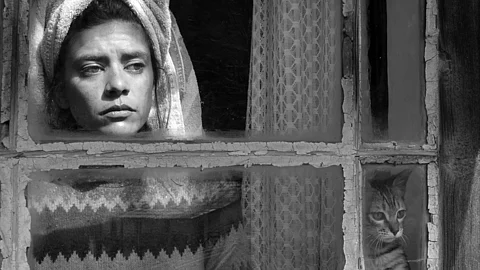
- HOMEGROWN WORLD
- #HGCREATORS
- #HGEXPLORE
- #HGVOICES
- #HGSHOP
- CAREERS
- ABOUT US
- CONTACT US

You ever wonder why we never hear of a female loneliness epidemic?
I think we can all agree that history has tilted, somewhat unapologetically, in favour of one gender. And while we receive an annual Women’s Day to honour our achievements, there’s no equivalent that allows us to examine the emotional costs of that endurance. There’s no 'women’s mental health month'. Probably because we haven't quite nailed the equality part yet. And when your physical autonomy, freedom, and basic rights are up for debate, emotional well-being becomes a luxury, something to tend to later, once the fires are put out.
The anguish, fatigue, and loneliness that comes with this fight then, is internalised, managed in private, or folded into the myth of female resilience. We learn early on to confide in each other instead because so many of our grievances were caused by those who claimed to protect us. We learn to survive through the solidarity of womanhood. But that doesn’t mean navigating or even just being honest about our struggles gets any easier.
In Subhadra Mahajan’s debut film, 'Second Chance', this unexplored terrain finally sees the light of day. Centered around the intimate portrayal of a young woman’s pain, the film addresses the labour that goes into surviving a crisis of the soul before any healing can take place.
The story revolves around Nia, a 25-year-old played by Dheera Johnson, who retreats to her family’s summer home in the mountains after going through the trauma of an abortion. On the phone, she tells her parents that she hasn't run away and is just looking for some alone time. But her hollow, disconnected presence suggests otherwise. We see her bedrotting under layers of wool, aimlessly walking through empty rooms, staring out into a landscape that mirrors her internal barrenness.
The fight for reproductive rights is often mischaracterised with the narrative that undermines the toll abortion takes on women. We fail to understand that even when we choose it, we must suffer its consequences. It’s a battle, not merely of morality, but with one’s own body and mind. This physical, psychic, spiritual pain that many women go through rarely makes it to the screen. In addressing the political or ethical aspects of it, we completely disregard the emotional.
Second Chance then, becomes an inherently feminist film simply because it allows its female protagonist the liberty of falling apart. That freedom is radical. As a screenwriter, who just won the best screenplay at the New York Indian Film festival, Subhadra gives her protagonist the space to be lost. And in a cultural landscape where putting women on a pedestal becomes yet another way to control them, her choice to centre a woman’s sorrow and unbecoming is revolutionary.
Shot in velvety and poetic black and white by cinematographer Swapnil S. Sonawane, the film finds a visual metaphor for darkness and light that forms its central theme. The absence of colour renders the landscape timeless and isolating. The mountains as opposed to serving as a romantic backdrop, become indifferent, immovable, and essential to Nia’s emotional landscape. The cinematography, sound design, and art direction work in synchrony to build this world that feels sacred in its solitude.
But what begins as a solitary experience soon opens up to welcome two more characters: Bhemi (played by Thakri Devi), the elderly housekeeper, and her grandson Sunny (Kanav Thakur). Bhemi is a hardened, weather-worn woman; a little jaded, but not unkind. She and Nia are from different worlds, bonded by their private histories of pain. In a particularly affecting parallel, the film uses these two women to explore the spectrum of feminine resilience: one still raw and in the midst of suffering, the other toughened by time but still vulnerable.
In the nurturing presence of a fellow woman, the friendship of a young boy, the hoots of a night owl that keeps her company, the cradle of the mountains, and a kitten that finds her at just the right time, Nia starts feeling like herself again. In many ways, Second Chance is about these small, fragile bonds that pull us back into life when we're in a hole within ourselves. Subhadra describes the film as one born out of a personal space and purpose, and her direction reflects that intimacy. “It is a story of hope in times of fractured societies, and of unlikely friendships in times of loneliness and isolation,” she says. “A story about light at the end of a long, dark tunnel.”
Like a sad song that ends up comforting a broken heart more than any of our failed attempts to 'cheer up', Second Chance alchemises an incredibly life-affirming response from a portrait of mourning and despair. Through a visually arresting journey into the somber inner world of Nia, we're baptised with both the alienating and enriching spoils of existence and all that it takes to hang on to hope.
Follow Subhadra here.
